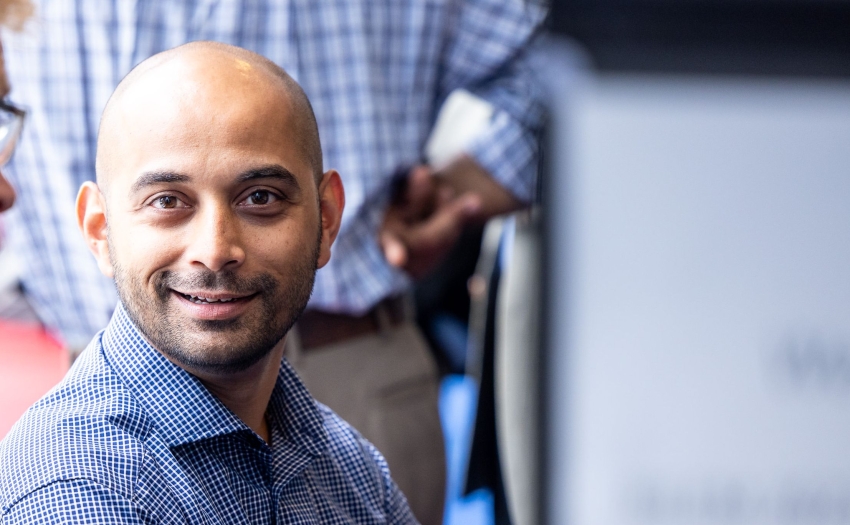News

Interview with Prof. Gaurav Sant, 2023 RILEM L'Hermite medallist
Dr Gaurav N. Sant is a Full Professor and the Pritzker Endowed Chair in Sustainability at the University of California, Los Angeles (UCLA), where he is Director of UCLA’s Institute for Carbon Management. The 2023 Robert L’Hermite medal was awarded to Prof. Sant in recognition of his activities aimed at developing new technologies for carbon dioxide management and improving the service life of modern construction materials. The presentation of Prof. Sant at the L’Hermite award ceremony during the 77th RILEM Annual Week this year, in Vancouver, Canada, is available here.
20 September 2023
***
Daniela Ciancio – RILEM Implementation Manager (RIM): Thank you so much again for waking up so early for this interview, Gaurav! My database tells me that you joined RILEM in 2014. Do you remember where you were when you joined? I understand you were already a doctor by then.
Prof. Gaurav Sant (Gaurav): Yes, I was. So… actually, Daniela, I've known RILEM for a long time. My Ph.D. advisor, Prof. Jason Weiss (Editor’s note: Prof. Sant completed Ph.D. studies at Purdue University, West Lafayette, IN, USA), was a member of RILEM. My other advisor, Dr Pietro Lura, was also a member of RILEM. In fact, Jason and Pietro are also L’Hermite medallists. Thereafter, I worked with Prof. Karen Scrivener at EPFL, also a member of RILEM. When I was a student, I'd actually been to a RILEM meeting and attended a RILEM course in Denmark in 2006 (Editor’s note: DTU-RILEM Doctoral Courses - Concrete Curing: From the Research Lab to the Construction Site, Lyngby, Denmark)...
RIM: ... in 2006 you were still a Master’s student, because you finished your Master’s degree in 2007!
Gaurav: No, I was actually not even a Master’s student because I had just graduated with a Bachelor’s degree (B.S. Civil Engineering) at that time.
RIM: You attended a RILEM Doctoral Course being an undergraduate?!?
Gaurav: Well, I had just finished my undergraduate degree at that time. Jason (Editor’s note: Prof. Jason Weiss) sent me there, so I went! Then I spent some time in Copenhagen, with Pietro (Editor’s note: Dr Pietro Lura) and Ole (Editor’s note: Prof. Ole Jensen); I actually gave a talk at a RILEM conference in 2006 in Denmark (Editor’s note: International RILEM Conference on Volume Changes of Hardening Concrete: Testing and Mitigation). Then I went back to Denmark for a RILEM conference in 2010 (Editor’s note: International RILEM Conference on Use of Superabsorbent Polymers and Other New Additives in Concrete). I moved to the U.S. at the end of 2010 to take up an Assistant Professorship at UCLA, and then for a couple of years, I had limited engagement with RILEM. In a few years, I determined engagement made sense, and so in 2014 I became a member and 10 years later… here we are!
RIM: It is not common to present at an international conference when you haven't even started a Master’s degree.
Gaurav: Well… a few things: 1) I actually started doing research as an undergraduate student with Jason. Pietro happened to be visiting Jason at that point, so I started working with Pietro, too. I was fortunate to undertake research as an undergraduate student; and 2) I worked with Pietro at Purdue, and thereafter Pietro went back to Denmark. Pietro and I have kept in touch over the years – and are close friends – so when he organised this course and this conference in 2006, Jason said “You should submit an abstract and if you get selected, we should go”. So… Jason and I, along with another Ph.D. student all went to Denmark together. It was a great experience.
RIM: How old were you?
Gaurav: I was 23. Young, for sure!
RIM: Then some years later, in 2017, you were awarded your first RILEM medal, the Colonnetti medal, in the second year of its establishment, and you received it together with Enrico (Editor’s note: Prof. Enrico Sassoni, RILEM TAC Chair) who introduced you in Vancouver this year.
Gaurav: Yes, that's what Enrico reminded me while in Vancouver.
RIM: Together with Prof. Susan Bernal, you are the only two people holding both RILEM medals, the Colonnetti and the L’Hermite.
Gaurav: Yes, but to be fair, the Colonnetti medal is a recent medal, so there might be other people too. We just don't know them yet, right?
RIM: Yes, it's true. Would you mind explaining in simple words your presentation in Vancouver?
Gaurav: The simplest way I can explain this is as follows: I've been interested in trying to understand how academic research can make a difference in a practical context, and from that perspective, one of several clear challenges that we face is related to carbon dioxide (CO2) emissions from cement production. It's a big industrial challenge, but also a big societal challenge because every single one of us are consumers of cement, indirectly, if not directly. I think engineering implies developing scientific solutions to practical problems. So, my work is focused on trying to define problems that are broad ranging and that affect many of us, and then to apply my training and capabilities to try to solve them. How you choose to do it, what tools you choose to use, is only partially relevant. Rather, the really important part is understanding the general problem at a systems level, to carefully approach the process of scoping the problem, and building and focusing a team of talented, motivated people to solve this(ese) problem(s).
RIM: So, the Institute for Carbon Management (ICM), from what you said, doesn't seem to be necessarily related to construction materials; cement and concrete. It happens to be related to cement because this is where you come from, but it could be anything else.
Gaurav: That’s exactly right, Daniela. Construction materials are only one part of the portfolio. In fact, the work we do spans many domains, and so only one-third of what we do is related to construction materials. I’m a third-generation civil engineer – and I have been fortunate to see the difference that (infrastructure, housing, industrial) development can make in people's lives. This matters because it really emphasises the importance of construction materials and of civil engineers and what we do. Given the fact that emissions from cement are such a big part of our industrial emissions base, it's a challenge and an opportunity. It's a challenge because we need to address it, but it's an opportunity because if we are able to address it, we can deliver really broad-based impact – and create an example for other industrial sectors to follow. These are the types of exciting problems that the brightest minds like to work on. So, when we want to think about attracting the smartest people to work on a topic, solutions that can make a difference for, and impact many people are very attractive! In summary, decarbonizing construction materials is an area which I think is very important, not simply because I trained in this domain, but because it touches all our lives.
RIM: You said that “construction materials” is more or less 1/3 of what you do. What about the remaining 2/3?
Gaurav: Beyond construction materials, we have a lot of ongoing work, for instance, in the general theme of carbon dioxide removal and mitigation – from the atmosphere, and from industrial operations, green hydrogen production particularly using non-potable water, and non-precious metal resources, and ongoing work focusing on securing critical materials, particularly lithium, nickel, cobalt, manganese and molybdenum: how do we create new supply chains and new manufacturing processes and new refining techniques for these materials?
RIM: I think that many people nowadays are working on decarbonization. How do you think your actions, your research, are going to make a difference? Is yours better or worse than other people's approach?
Gaurav: We established the Institute for Carbon Management (ICM) with a very clear mandate: we are a translational institute in that we don’t undertake “discovery” research. Rather, we seek to translate bench-scale research into pre-commercial, or commercial processes, devices, and systems. ICM bridges these two worlds – of discovery and practice – because we know that bench-scale research, and technical applied research are individually insufficient to deliver impact. A significant direction that is important to ICM is: how do you build translations pathways that go from bench-scale research and arrive at practical demonstrations that are viable for industry to adopt and scale? Said differently, we are a technology de-risking platform. We de-risk technologies taking them from the bench-scale to a pilot system while creating suitable and sufficient solutions for industrial entities to be able to adopt, or that can be the catalyst for creating pioneering startup companies.
RIM: There's been a recent paper published by RILEM Technical Letters in which the authors indicate what, according them, researchers around the world should focus their attention on to solve the problem of decarbonization of the cement industry. In the same paper, they suggest to abandon research areas that have been studied for a long time (last decades) but have not reached the level of industry implementation. Would you agree with this vision?
Gaurav: I am afraid I haven't read the paper, so I don't know much about it. In general, and at a high-level, I disagree with the vision – although I admit that in the realm of finite resources there’s a need to focus/define the solution space to maximize impact. That said, there are a few things that we can all agree on. Foremost, cement decarbonization is a big problem and there is no silver bullet. We are going to see different and diverse solutions: as a function of time - when it happens, of scale - how big it is, and where in the world they can be effectively fulfilled and delivered. When you take these three things and put them together, I think you can always make the argument that some solutions might be more successful than others, but I don't think we have a clear idea to choose a leading solution while disregarding or discounting all others. That said, I also think that academics tend to overly focus on, and emphasize their own expertise, interests and projects: i.e., a perspective where what I am most interested in, and what I work on is the best. This makes us lose objectivity, and can be problematic for (at least) two reasons: 1) we may potentially inhibit the unexpected solution from emerging; 2) we lock ourselves into choices that are difficult to unwind down the road. This is not unexpected: we make decisions based on where we are and based upon our best available information today; but often, without flexibility. But one thing that human beings generally do quite badly is predict the future! This is something that we should keep in mind before making broad generalisations of what would work, what may not work; today and in time to come – while making sure we don’t lose objectivity, disregard promising but emerging solutions, and while being committed in purpose, not in furthering our own interests.
RIM: You mentioned the geographical constraints of one’s research, that one solution can work in South America but doesn't work in Europe or India. What about “your solutions”?
Gaurav: While I do live and work in North America, we have teams in Singapore and are building a new team in India. And, so in our own small way, we do work around the world. The position that we've taken is to try and develop technological solutions, that as far as reasonable, are geographically encompassing. That said, most broadly, the question we're trying to ask is “if we think about the majority of the scenarios that come to mind, will our solutions potentially apply and scale?” If the answer is yes, that's great – and makes them worthy of pursuit! At ICM, we have focused on the premise that perfection is the enemy of the good. This thinking is very important, and as academics, we often lose sight of it. For example, as academics, we always focus on the perfect experiment, the perfect conditions, the best result we can get. Unfortunately, the real world is quite messy, and I think that this practical messiness is important to absorb and accept.
RIM: Thank you, Gaurav. I would like to ask you more questions, but I am afraid we have run out of time. The readers can learn more about your presentation by watching the video on YouTube. Thank you again for your availability and the nice chat!
Gaurav: Wonderful. Thank you very much, Daniela.
 1
1













No comment
Log in to post comment. Log in.